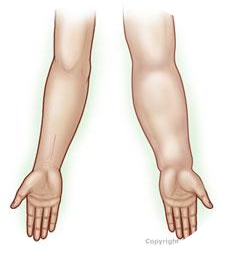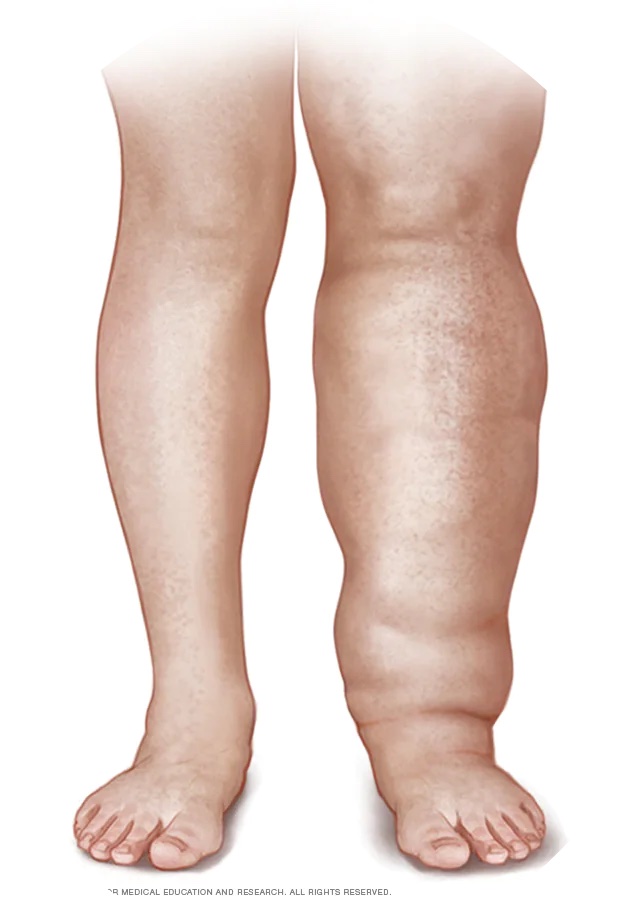Lymphedema is swelling in various areas of your body that happens when something affects your lymphatic system. Your lymphatic system collects excess fluid, proteins and toxins from your cells and tissues and returns them to your bloodstream.
When your lymphatic system doesn’t work well, your body accumulates fluid and may begin to swell. The swelling typically affects your arms and legs, but it can affect other areas of your body, too. Lymphedema also increases your risk of developing an infection where you have the condition.
This can happen after certain surgeries or because you have certain medical conditions or genetic conditions. You may develop lymphedema spontaneously, meaning it happens for no known reason.
Lymphedema symptoms may be mild, causing minor swelling and discomfort. Sometimes, however, lymphedema may cause significant swelling that can be painful and cause skin issues such as infections and wounds. Healthcare providers can’t cure lymphedema, but they do have treatments to reduce lymphedema swelling and discomfort. There are also many things you can do to limit the impact lymphedema may have on your quality of life.
How does lymphedema affect my body?
If you have lymphedema, your arms, legs, feet and other areas of your body may look and feel swollen. Lymphedema can be painful and may affect your ability to manage daily activities. Many people with lymphedema feel self-conscious about the ways lymphedema changes their appearance.
Is lymphedema a serious medical condition?
It can be. If you have lymphedema, you may be at risk of developing infections that start in your skin. These infections may be life-threatening. Rarely, lymphedema may also lead to lymphangiosarcoma, a very rare skin cancer.
Are there different types of lymphedema?
Yes, there are two types of lymphedema — primary and secondary.
What is primary lymphedema?
Primary lymphedema comes from rare, inherited conditions that affect how your lymphatic system develops. Primary lymphedema affects about 1 in 100,000 people in the U.S. Lymphedema from these conditions can appear at these ages:
- Infancy: Infants may be born with Milroy’s disease, an iform of lymphedema.
- Puberty, during pregnancy or up until age 35: Meige’s disease (lymphedema praecox may affect people going through puberty or pregnancy and up until age 35.
- After age 35: A rare, late-onset lymphedema (lymphedema tarda) can cause lymphedema, with swelling limited to your legs.
What is secondary lymphedema?
Secondary lymphedema may happen if your lymphatic system is damaged from surgery, trauma or radiation therapy. Lymphedema is most common in people who’ve had breast cancer treatment. That said, not everyone who has breast cancer treatment develops lymphedema.
SYMPTOMS AND CAUSES
What are lymphedema symptoms?
The most common symptom is swelling. Swelling may develop slowly. You may not notice unusual swelling in lymphedema’s early stages. Swelling from lymphedema may also come on suddenly. Other lymphedema symptoms you may notice include:
- You can’t see or feel the veins or tendons in your hands and feet.
- Your arms or legs appear to be slightly different sizes.
- It feels as if your joints are unusually tight or inflexible.
- Your skin seems puffy or red.
- Swelling in your arms or legs or other areas of your body.
- Your arms, legs or other parts of your body feel uncomfortably heavy or full.
- Your clothes or jewelry fit more tightly than usual.
- You have a feeling of burning or itching.
- Your skin becomes noticeably thicker.
What causes lymphedema?
Several things may cause lymphedema, including:
- Breast cancer surgery: Sometimes, breast cancer surgery includes removing lymph nodes under your arms and possibly damaging nearby lymph vessels.
- Pelvic surgery: Surgery to remove pelvic lymph nodes may cause lymphedema.
- Radiation therapy: Radiation therapy may cause scarring and damage to your lymphatic system, inflaming your skin and placing pressure on your lymphatic circulation system.
- Trauma: Your lymphatic system is a rich network of vessels that are directly under your skin, as well as deep. Sometimes, trauma to an area of your body may damage lymphatic vessels under your skin, causing lymphedema.
- Infection: An infection may increase lymphatic system damage.
- Having obesity: People who have obesity may have excess fat (adipose tissue) that puts pressure on lymph nodes and vessels. That extra pressure may affect lymphatic drainage.
- Lack of activity: Your leg muscles pump up lymphatic circulation. If you’re not active, you may have swelling in your legs.
- Tumors: Tumors may block lymphatic drainage.
- Heart conditions: People who have heart issues, particularly congestive heart failure, may develop lymphedema. Your lymphatic ducts empty lymph back into your heart. If your heart isn’t working as well as it should, you may notice you’re gaining weight or your legs are swollen.
- Blood vessel issues: Your blood vessels carry between 80% and 90% of fluid throughout your body. When something affects your blood vessels (vascular system), you may develop chronic blood vessel issues. Chronic blood vessel issues may cause lymphedema.
- Kidney disease: Your kidneys work to remove extra fluid and waste products from your body. If your kidneys don’t function as they should, your body may have trouble removing fluid. Excess fluid may cause swelling that leads to lymphedema.
What are lymphedema treatments?
Compression garments
Physical Therapy
Multi-layer bandaging System
Elevation
**Compression devices: These pneumatic compression pumps provide on-and-off pressure to keep fluid moving through your lymph vessels and veins so it doesn’t build up in your arms, legs and other parts of your body. The devices work by connecting the pump to a sleeve that wraps around your affected areas. The pump drives a regular cycle of pressure that inflates and deflates the sleeve. Compression pumps may also reduce complications of lymphedema.
Please call or email Total Compression Pumps for more information
contact@totalcompressionpumps.com
800 854-0335



